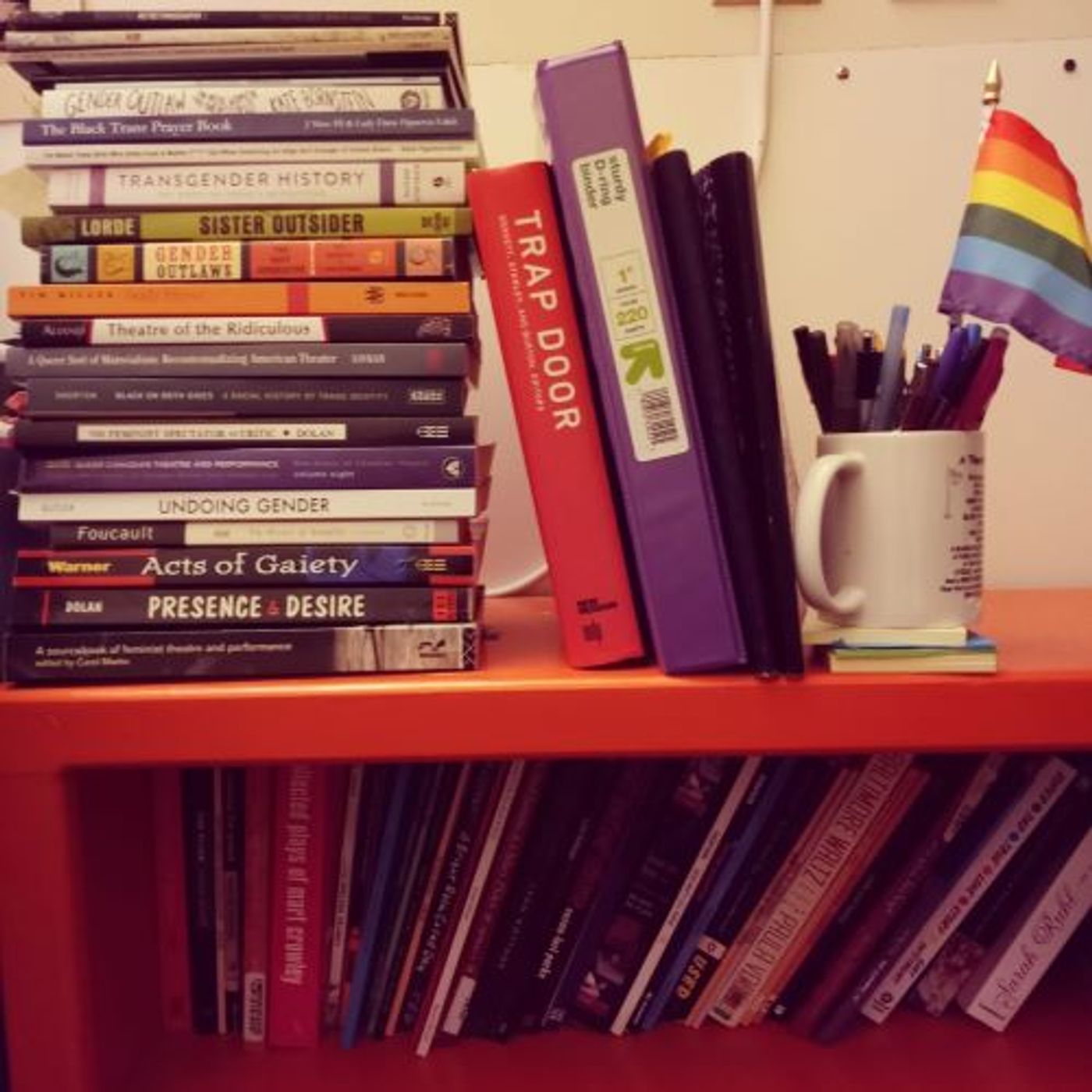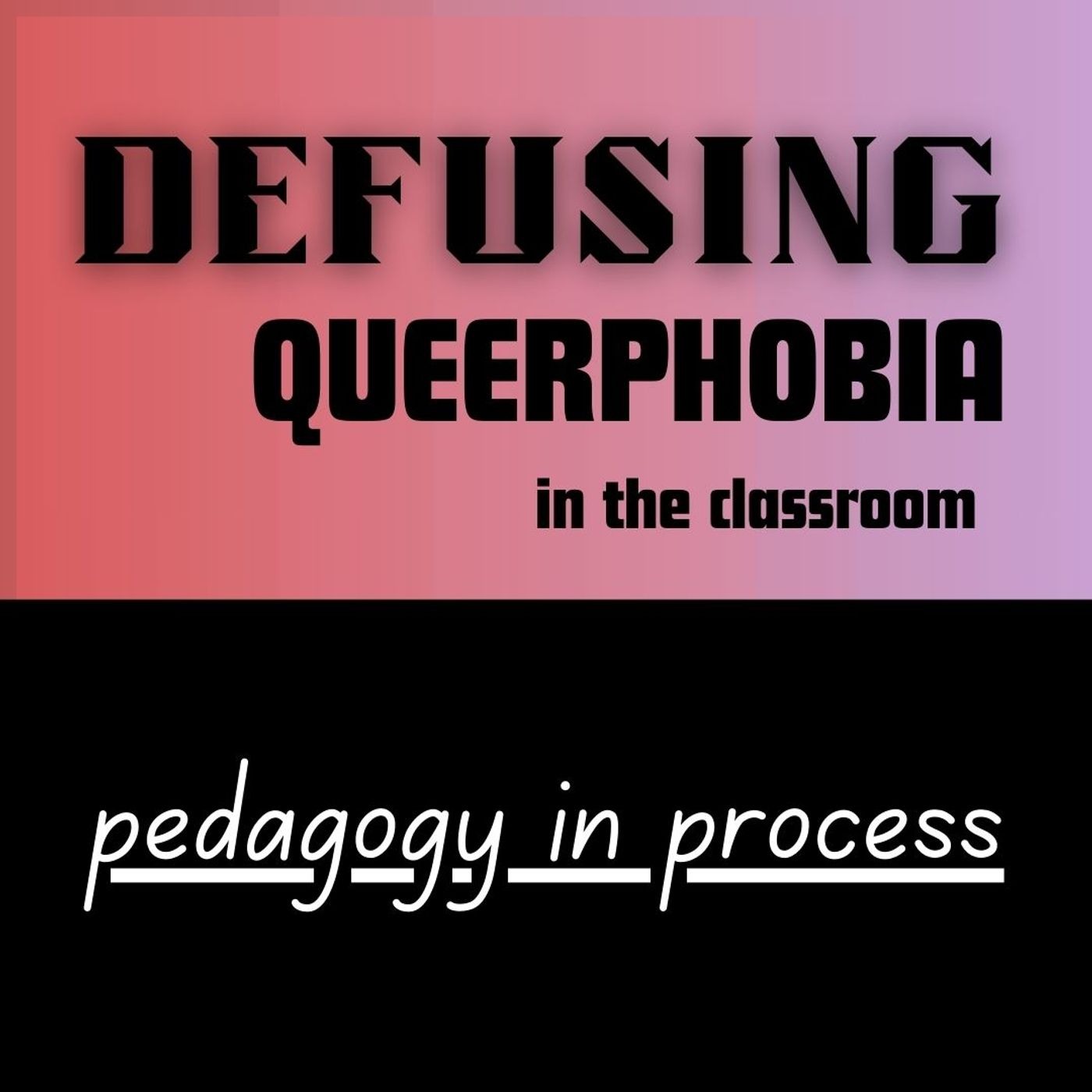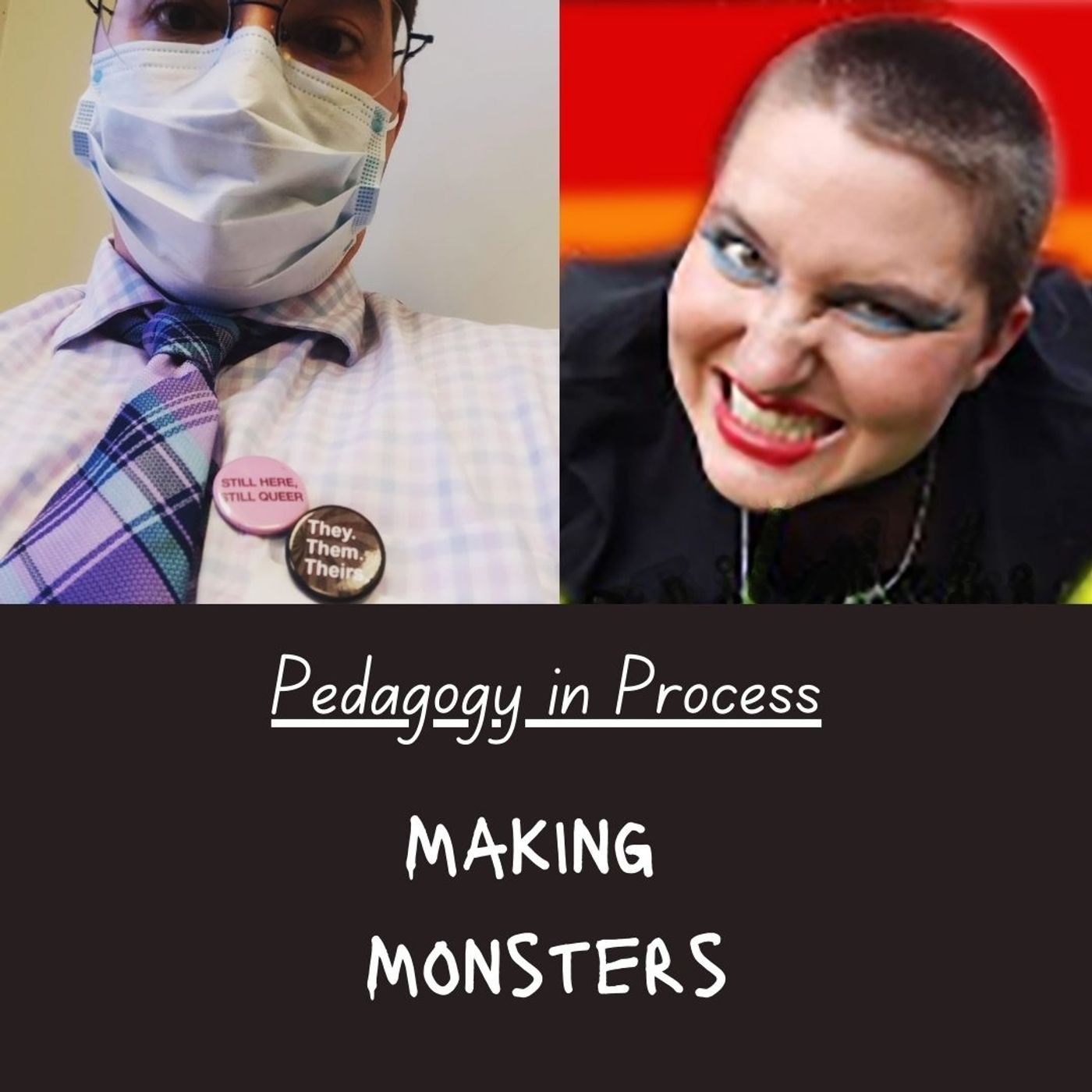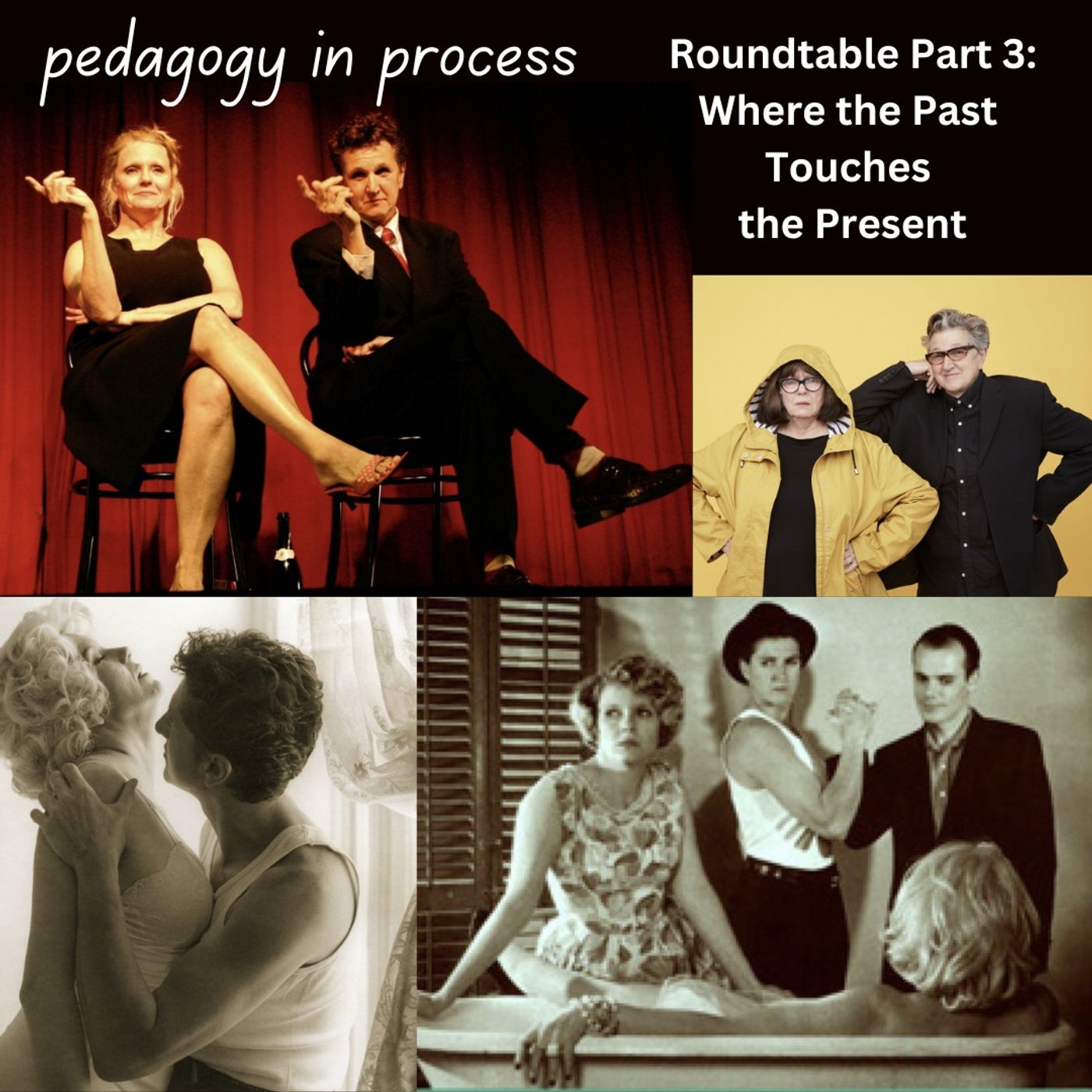Discover Pedagogy in Process
Pedagogy in Process

 Pedagogy in Process
Pedagogy in Process
Author: Nicolas Shannon Savard
Subscribed: 1Played: 0Subscribe
Share
© Copyright Nicolas Shannon Savard
Description
Pedagogy in Process is an independent podcast by and for educators working at the intersections of social justice and the arts and humanities.
This podcast seeks to create a space for educators to be in dialogue; for complicated, thorny questions with no easy answers; for honesty and vulnerability; for being really, really nerdy; for staring down impossible challenges but deciding to tackle them anyway; for working through it all together. This podcast will hold space for generative, messy, complex, challenging, always important conversations with fellow educators. We’ll share successes, stumbling blocks, creative interventions, and lessons learned through the process of building more inclusive, equitable, and collaborative learning environments.
Ultimately, the goal is to make these insights, tools, and resources accessible to other teachers working through the same questions in a format that can meet them where they are. 20-30 minutes at a time, in the car, on the bus, on a run, wherever and whenever you might find a moment to connect. I hope you'll join us.
Pedagogy in Process is hosted, edited, and produced by Nicolas Shannon Savard, PhD (they/them/theirs). drnssavard.com
This podcast seeks to create a space for educators to be in dialogue; for complicated, thorny questions with no easy answers; for honesty and vulnerability; for being really, really nerdy; for staring down impossible challenges but deciding to tackle them anyway; for working through it all together. This podcast will hold space for generative, messy, complex, challenging, always important conversations with fellow educators. We’ll share successes, stumbling blocks, creative interventions, and lessons learned through the process of building more inclusive, equitable, and collaborative learning environments.
Ultimately, the goal is to make these insights, tools, and resources accessible to other teachers working through the same questions in a format that can meet them where they are. 20-30 minutes at a time, in the car, on the bus, on a run, wherever and whenever you might find a moment to connect. I hope you'll join us.
Pedagogy in Process is hosted, edited, and produced by Nicolas Shannon Savard, PhD (they/them/theirs). drnssavard.com
8 Episodes
Reverse
Host Nicolas Shannon Savard and (returning guest!) Katya Vrtis turn their practice of crip theorizing-in-process to Mia Mingus’ concept of access intimacy and the possibilities it offers as a way of thinking about and practicing accessibility in higher education. Key Questions: What is access intimacy, and what interventions might it make where higher ed’s other models of accessibility (ADA, Universal Design, DEI) fall short? How did you come to thinking about and practicing access intimacy in the academic/artistic spaces you inhabit? In other words, for you, why did access intimacy feel so necessary? Key Texts: Mia Mingus, “Access Intimacy: The Missing Link” Desiree Valentine, “Shifting the Weight of Inaccessibility: Access Intimacy as a Critical Phenomenological Ethos” Katya Vrtis, “Access Intimacy as a Philosophy of Care in Post-Pandemic Academic Theatre.” Theatre History Studies 42 (2023). (link) Nicolas Shannon Savard, “Do we Get More Points if we Take Bigger Risks? Modeling Boundary-Setting in the Undergraduate Acting Classroom,” Journal of Consent-Based Performance 2, no. 1 (2023). (link) Additional Links: Transcript: Episode 8. Access Intimacy in Academic Spaces Zotero Library: for theatre scholars who’ve been cut from the syllabus to make room for Shakespeare for theatre scholars | Zotero Pedagogy in Process Blog on DRNSSAVARD.COM Guest Bio: Dr. Catherine (Katya) Vrtis is an independent scholar of Theatre and Performance Studies. They graduated from Tufts University with a PhD in Drama in 2017. Their dissertation, titled “Black or Red: The Creation of Identity in the Radical Plays of Langston Hughes,” examined performance of identity, Black v. White Communism in the United States, and anti-Fascist activism prior to World War II. The Journal of African American Studies published a revised chapter under the title “Proletarian Plays for Proletarian Audiences: Langston Hughes and Harvest” in the September 2021 issue. Dr. Vrtis has also expanded their work on the performance of marginalized identities into the study of cultural discourses of freakery and monstrosity, especially as it applies to medicalized queer and disabled bodies. This research can be seen in “Defending the Patriarchy: The Monstrous (Queer) Other and the Anti-Carnivalesque,” in the anthology Monsters in Performance: Essays on the Aesthetics of Disqualification edited by Dr. Michael Chemers and Dr. Analola Santana and will also appear in “Freakish Fecundity: Reproductive and Large Family Reality Television as Eugenicist Discourse” in Freakery Too: Further Explorations of the Extraordinary Body in Performance edited by Dr. Rosemarie Garland-Thomson, Dr. Michael Chemers, and Dr. Analola Santana. Their writing on disability/crip informed pedagogy includes “Access Intimacy as a Philosophy of Care in Post-Pandemic Academic Theatre” in volume 42 of Theatre History Studies and “Mission Possible: Practical Steps to a More Accessible Classroom” in Theatre/Practice 13, which was co-written with Cassandra White, Florida Division of Arts, and Culture and Deborah Kochman, University of South Florida. Dr. Vrtis co-founded and served as the inaugural chair of the Disability, Theatre, and Performance Focus Group for the Association of Theatre in Higher Education and currently serves as the Accessibility Officer for the Mid-America Theatre Conference and in additional positions across the field dedicated to improving access and representation for disabled scholars. Pedagogy in Process—a podcast by and for educators working at the intersections of social justice, the arts, and the humanities. Hosted, edited, and produced by Nicolas Shannon Savard.
In this episode, university arts educators share practical strategies for defusing homophobia and transphobia in the classroom while accounting for our increasingly polarized political realities across the U.S. Rather than combatting or fighting queerphobia, they present approaches they have used to keep students engaged in dialogue and promote inclusive, respectful classroom culture. The mini presentations feature: Michael Osinski, “Reframing and Revising Politicized Language”Lucas Skjaret, “Keeping the Faith: Queer Mediations/Meditations at a Parochial University”Sidney Monroe Williams, “Are you a Gay Black or a Black Gay Professor? Butch Queen Disidentifications within Academia”Winter Phong, “Teaching in Red States, IDEAS for Change”Ann Elizabeth Armstrong, “CLARA: Tools for Responding to Hate Speech.”This episode was recorded at the 2023 Association for Theatre in Higher Education Conference. “Defusing Queerphobia in the Classroom” was co-sponsored by the LGBTQ+ and Disability, Theatre, and Performance (DTAP) Focus Groups. Pedagogy in Process—a podcast by and for educators working at the intersections of social justice, the arts, and the humanities. Hosted, edited, and produced by Nicolas Shannon Savard.Links:Transcript Ep. 7 Defusing QueerphobiaZotero Library: for theatre scholars who’ve been cut from the syllabus to make room for Shakespeare for theatre scholars | ZoteroPedagogy in Process Blog on DRNSSAVARD.COM
Nicolas, Dr. Katya Vrtis and Kairos Looney continue their discussion on what disability history can teach us about the contemporary wave of anti-trans politics. Bringing together performance studies with queer-/crip and critical race theories, the conversation serves as a space to theorize collaboratively, to process, to strategize modes of resistance. This conversation was presented under the title “We Are/Not Monsters: Queer/-Crip Theorizing in Process” at the 2023 Association for Theatre in Higher Education Conference. It was co-sponsored by the LGBTQ+ and Disability, Theatre, and Performance (DTAP) Focus Groups. KEY QUESTIONS 1. What does it mean to be a monster? 2. Where can we see remnants of the era of the freak show in the present day medical model of disability? 3. How is the history of the medicalization of same-sex attraction and gender nonconformity still informing political arguments around trans identity and healthcare? 4. How do logics of "cure" frame non-normative, queer, disabled, racialized bodies as either excessive or insufficient, in need of fixing? How are those narratives weaponized to police non-normative bodyminds? 5. How do white supremacist, patriarchal social structures demand queer, trans, disabled people perform in order to "prove" our own humanity on stage, in the doctor's office, in the classroom, in the legislature? 6. What are the radical possibilities of refusing to provide such proof, of embracing monstrosity? What are the consequences of refusing to engage in such performances? 7. Who are some of the key scholars, thinkers, writers, activists, artists informing your thinking on this topic? Who do you want to bring into this conversation? (Search “monsters” in our shared library to learn more! Zotero Library: for theatre scholars | Zotero) Pedagogy in Process—a podcast by and for educators working at the intersections of social justice, the arts, and the humanities. Hosted, edited, and produced by Nicolas Shannon Savard. Links: Transcript Ep. 6 Making Monsters History.docx Zotero Library: for theatre scholars who’ve been cut from the syllabus to make room for Shakespeare for theatre scholars | Zotero Pedagogy in Process Blog on DRNSSAVARD.COM
Host Nicolas Shannon Savard is joined by Dr. Katya Vrtis and Kairos Looney to unpack the contemporary wave of anti-trans politics. Bringing together performance studies with queer-/crip and critical race theories, the conversation serves as a space to theorize collaboratively, to process, to strategize modes of resistance. This conversation was presented under the title “We Are/Not Monsters: Queer/-Crip Theorizing in Process” at the 2023 Association for Theatre in Higher Education Conference. It was co-sponsored by the LGBTQ+ and Disability, Theatre, and Performance (DTAP) Focus Groups. KEY QUESTIONS 1. What does it mean to be a monster? 2. Where can we see remnants of the era of the freak show in the present day medical model of disability? 3. How is the history of the medicalization of same-sex attraction and gender nonconformity still informing political arguments around trans identity and healthcare? 4. How do logics of "cure" frame non-normative, queer, disabled, racialized bodies as either excessive or insufficient, in need of fixing? How are those narratives weaponized to police non-normative bodyminds? 5. How do white supremacist, patriarchal social structures demand queer, trans, disabled people perform in order to "prove" our own humanity on stage, in the doctor's office, in the classroom, in the legislature? 6. What are the radical possibilities of refusing to provide such proof, of embracing monstrosity? What are the consequences of refusing to engage in such performances? 7. Who are some of the key scholars, thinkers, writers, activists, artists informing your thinking on this topic? Who do you want to bring into this conversation? (Search “monsters” in our shared library to learn more! Zotero Library: for theatre scholars | Zotero) Pedagogy in Process—a podcast by and for educators working at the intersections of social justice, the arts, and the humanities. Hosted, edited, and produced by Nicolas Shannon Savard. Links: Transcript Ep. 5 Making Monsters Queer Crip Theorizing Zotero Library: for theatre scholars who’ve been cut from the syllabus to make room for Shakespeare for theatre scholars | Zotero Pedagogy in Process Blog on DRNSSAVARD.COM
Pedagogy in Process—a podcast by and for educators working at the intersections of social justice, the arts, and the humanities. This episode is part 3 of the Queer Archival Praxis Roundtable series of conversations with theatre historians, artists, and educators. Pedagogy in Process host Nicolas Shannon Savard, Kelly Aliano, Keenan Shionylan, and Ben Gillespie explore the questions: What discoveries arise through queer archival strategies focused on repair? What technologies or strategies do we use to confront the limiting, censoring, or destruction of archives? How do we advocate for reparative archival practices? For practices that may remedy intergenerational breakages? The conversation offers a range of queer interventions for scholars and students of performance and history alike. This conversation was recorded at the 2023 Association for Theatre in Higher Education Conference and co-sponsored by the LGBTQ+, American Theatre and Drama Society, and Theatre History Focus Groups. Links: Transcript Ep. 4 Where the Past Touches the Present Zotero Library: for theatre scholars who’ve been cut from the syllabus to make room for Shakespeare for theatre scholars | Zotero Pedagogy in Process Blog on DRNSSAVARD.COM
Pedagogy in Process—a podcast by and for educators working at the intersections of social justice, the arts, and the humanities. This episode is part two of the Queer Archival Praxis Roundtable series of conversations with theatre historians, artists, and educators. Pedagogy in Process host Nicolas Shannon Savard, Kelly Aliano, Keenan Shionylan, and Ben Gillespie explore the questions: What are the different ways queerness has emerged and/or been defined in the time periods and locations we study? How have the constraints of existing archives caused (invited? necessitated?) what Jack Halberstam calls "queer failure”? Where do we see queer possibility in the archive? Their conversation offers a range of queer interventions for scholars and students of performance and history alike. This conversation was recorded at the 2023 Association for Theatre in Higher Education Conference and co-sponsored by the LGBTQ+, American Theatre and Drama Society, and Theatre History Focus Groups. Links: Pedagogy in Process Blog on DRNSSAVARD.COM Transcript Ep. 3 Queer Failure, Queer Possibility.docx Zotero Library: for theatre scholars who’ve been cut from the syllabus to make room for Shakespeare for theatre scholars | Zotero
Pedagogy in Process—a podcast by and for educators working at the intersections of social justice, the arts, and the humanities. Host Nicolas Shannon Savard invites queer theatre artist-educator-historians Janet Werther, Kelli Crump, Jordan Ealy, Victoria Lafave to dig into how we bring a queer eye to history in the classroom, what power and responsibility we have as queer artist-educators to disrupt white supremacy in the archive and our institutions and strategies for building solidarity.This conversation is part of a longer roundtable dialogue which was presented as part of the 2023 Association for Theatre in Higher Education Conference, titled "Queer Archival Praxis: Histories and Methodologies."The first part aired on "Gender Euphoria the Podcast" on HowlRound Theatre Commons in September. Links:Listen to first half of this conversation on Gender Euphoria the PodcastTranscript Ep. 2 Queer Archival Praxis RoundtablePedagogy in Process Blog on DRNSSAVARD.COM Zotero Library: for theatre scholars who’ve been cut from the syllabus to make room for Shakespeare for theatre scholars | Zotero
Pedagogy in Process is an independent podcast by and for educators working at the intersections of social justice and the arts and humanities.This podcast seeks to create a space for educators to be in dialogue; for complicated, thorny questions with no easy answers; for honesty and vulnerability; for being really, really nerdy; for staring down impossible challenges but deciding to tackle them anyway; for working through it all together. This podcast will hold space for generative, messy, complex, challenging, always important conversations with fellow educators. We’ll share successes, stumbling blocks, creative interventions, and lessons learned through the process of building more inclusive, equitable, and collaborative learning environments. Ultimately, the goal is to make these insights, tools, and resources accessible to other teachers working through the same questions in a format that can meet them where they are. 20-30 minutes at a time, in the car, on the bus, on a run, wherever and whenever you might find a moment to connect. I hope you'll join us.Pedagogy in Process is hosted, edited, and produced by Nicolas Shannon Savard, PhD (they/them/theirs).drnssavard.com







